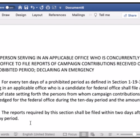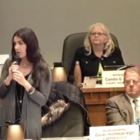2021 Legislative Session
Lawmakers running for Congress don’t have to disclose fundraising during session. We asked them to.
|
Legislators are barred from soliciting campaign contributions while the Roundhouse is in session– unless they happen to be running for Congress.
During the state’s prohibited fundraising period, lasting from January 1st to the end of the session, lawmakers may not solicit any campaign contributions and lobbyists may not donate to any state campaigns. But federal campaigns aren’t subject to state law. This means four Democratic state lawmakers running for an open congressional seat may fundraise at the same time they’re conducting state business during the 2021 legislative session. New Mexicans won’t officially know who contributed to them until after the session.
“The original intent of having a prohibited period for state lawmakers was so that the public wouldn’t have the perception that lobbyists were literally giving our elected officials money for their state campaigns while they’re in the middle of a legislative session,” said Heather Ferguson, executive director of Common Cause New Mexico. On Wednesday, the Senate Rules Committee unanimously endorsed a bill sponsored by Sen. Jacob Candelaria, D-Albuquerque, that would require state elected officials running for federal office to disclose their donors every ten days during the prohibited period.








